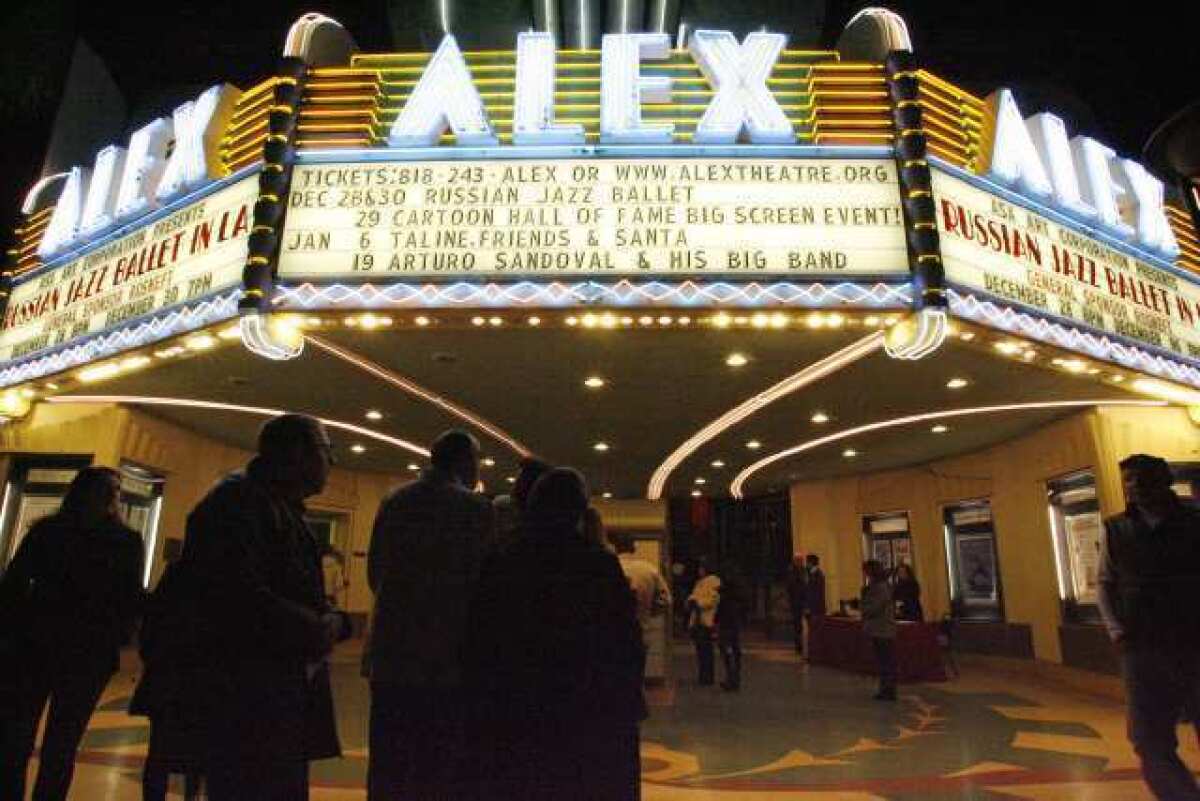Alex Theatre will remain in hands of nonprofit — with conditions

- Share via
Glendale’s nearly century-old, city-owned Alex Theatre is poised to remain under control of the same nonprofit that’s overseen significant renovations and expanded operations over the years — but with a mandate to move toward a more self-sufficient business model.
Last week, Glendale City Council members voted to support extending a contract with Glendale Arts for five years. During that time, several members said they expect to see a business model that offsets costs for the theater that the city supports financially in the form of a management fee and some capital improvements.
“There are many facets to the management of the theater. It’s not just the production work, it’s not just fixing the holes in the wall,” Glendale Mayor Ara Najarian said during the special afternoon meeting.
“It’s getting [institutional or corporate] involvement. It’s getting a Disney-type sponsor… or a lot of other smaller folks getting involved to help defray the capital expenses,” he added.
The deal isn’t done, though. Now, negotiations between the nonprofit’s board members and city staff will commence to hammer out the contract details. A tentative agreement will then return to the City Council for final consideration before the current contract expires next summer.
Elissa Glickman, chief executive of the nonprofit that was formed in 2008, said she wasn’t disappointed in the outcome of the meeting — although the organization had requested a 10-year extension — but she said she was disappointed by how some council members framed their discussions around the money the city allocated to the theater.
“We’ve done an extraordinary job keeping the venue clean and maintained and well operated and managed, and there’s a cost to doing that,” Glickman said after the meeting. “At this point, this council is not subsidizing the theater. It’s not a gift, it’s not a contribution… It’s money that we earn.”
With Glickman at the helm of the nonprofit for the past eight years, the budget has grown to $2.5 million, from $1.5 million during the 2013-14 fiscal year, even as the management fee has been gradually reduced from $415,000 to the current $150,000 annually.
Events are held at the theater more than 200 days a year, she added.
The nonprofit maintains a full-time staff of 17 and a part-time staff of 50. Labor costs are the nonprofit’s biggest expenditure, Glickman said.
Self-sufficiency for the theater has long been the No. 1 talking point, Glickman said.
“It would be irresponsible to continue to reinforce a message that is just not obtainable,” Glickman said, adding that it would be possible “in a perfect world.”
Just as the theater approached a profit, its $220,000 audio system could break, she said as a hypothetical. That situation would plunge the aging theater back into the red.
Several council members said they supported forming a committee or holding a study session to generate ideas about how the theater can further offset its costs, even if it doesn’t achieve full self-sufficiency.
“I think there is a little bit of misconception out there that maybe this City Council is not for the Alex, that maybe we don’t care about the community aspect of it, or maybe that we care only about the money,” Councilman Vartan Gharpetian said during the meeting. “I think that’s all wrong.”
“If we have to subsidize [the theater], we’ll subsidize it, but we want to know where we are going,” said Gharpetian as he pitched a study session.
Meanwhile, Glickman said the nonprofit’s plan to raise money by selling naming rights for seats or specific areas of the theater, as well as seeking larger donations, will be hindered by drawn-out negotiations or a short contract term.
The life cycle for naming rights tends to be 10- to 20-year periods, according to Glickman.
“We need longevity in order for people to feel safe and secure,” she said.
